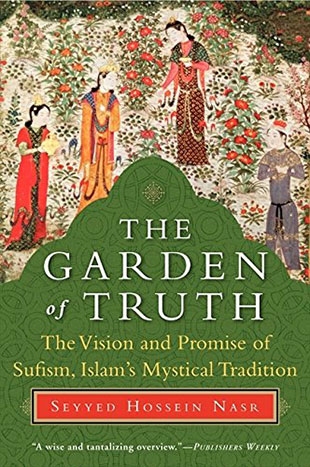Seyyed Hossein Nasr is professor of Islamic Studies at George Washington University and the author of many books including The Heart of Islam. This erudite, enlightening, and wide-ranging overview of Sufism is the result of 50 years of both scholarly study and existential participation in Islam's mystical tradition. He notes at the start of this survey:
"The Sufi tradition contains a vast metaphysical and cosmological set of doctrines elaborated over a long period by masters of gnosis. It contains methods of spiritual realization that address nearly all the different spiritual possibilities on the levels of action, love, and knowledge. It has preserved over many centuries going back to the Prophet a regular chain of transmission of initiatic power (walayah/wilayah) and the grace (al-barakah) necessary for the spiritual journey. And above all, it can enable men and women to reach a state of sanctity."
Nasr believes that Sufism is uniquely qualified to help spiritual seekers in the West appreciate other religions and to serve as an antidote to Islamic fundamentalism. With its rich blend of mystical poetry, its diverse literature, its spiritual ethics, and its many musical masterworks, this path of the heart speaks to all those who yearn for a closer intimacy with God, a richer interior life, and a spiritual repertoire of practices that give life depth and meaning.
The book is divided into sections on:
• What It Means to Be Human (Who Are We and What Are We Doing Here?)
• Truth (The Knowledge That Illuminates and Delivers from the Bondage of Ignorance)
• Love and Beauty (The Fire That Attracts and Consumes, the Peace That Calms and Liberates)
• Goodness and Human Action (To Do His Will, to Conform to the Divine Norm)
• How Do We Reach the Garden of Truth? (The Path to the One)
• Access to the Center (Sufism Here and Now)
• The Sufi Tradition and the Sufi Orders (Reflections on the Manifestation of Sufism in Time and Space)
• The Tradition of Theoretical Sufism and Gnosis
The Sufi path leads from the deserts of forgetfulness, selfishness, and separation to the Garden of Truth where individuals can realize their true identity. According to Nasr, followers of the path are expected to be God's servant and always grateful, no matter what the circumstances. The author acknowledges that the road to the Garden of Truth involves acquiring and realizing unitive knowledge and being immersed in love and beauty. Sufis are known as "people of the heart," and intimacy with God means acting with humility, charity, nobility, sincerity, and truthfulness. Another practice is imitation of the Prophet Muhammad, who modeled a glorious way to live. Sufi masters talk about the importance of adab, a form of courtesy and kindness which pervades everything one does, from greeting people to eating to sitting in a gathering. Shaykhs help dervishes learn the spiritual disciplines and virtues, which are the ornaments of the soul.
According to Nasr, the integration of the contemplative life and the active life is the hallmark of Sufi spirituality. In these uncivil times, we need more people who have been trained in the spiritual efficacy of loving actions. A life of beauty is a life where attention, being present, gratitude, peace, and compassion are manifested at home and at work. Sufism also nurtures the spiritual arts which in turn can transform our lives both privately and publicly. The Garden of Truth by Seyyed Hossein Nasr is a very helpful illumination of this beautiful path.
